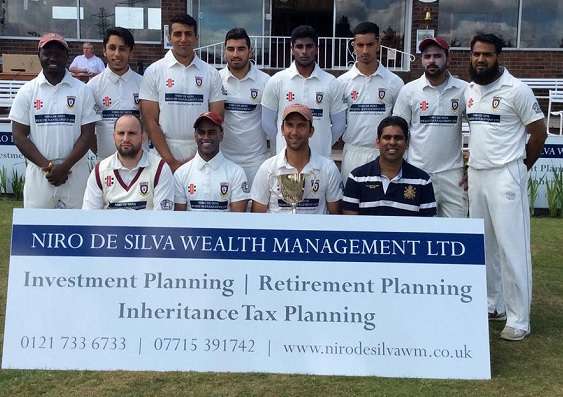Charlie Talbot-Smith uncovers the inside track on Eric Hollies, who wrecked a legend’s farewell
The legend of Don Bradman is world-renowned but the story of the man who toppled him for the last time is reserved for a very special place in West Bromwich Dartmouth’s history.
The Birmingham and District club was founded in 1834 – though some sources trace its ancestral roots back two decades further – and is still thriving some two centuries later.
But, perhaps, no man in their history achieved as much notoriety as Eric Hollies, the leg-spinner who made sure Bradman’s Test average is frozen in time on 99.94.
Before he inspired the most famous duck of all time in 1948, Hollies took a staggering 499 wickets during World War Two for the Dartmouth and current club chairman Laurence Silvester was lucky to see him in his pomp.
“When I first started going to the club in 1939 we had Hollies from Warwickshire play for us and I don’t know why he wasn’t called up,” said Silvester.
“He was our professional during the war and there was only one season he didn’t take 100 wickets. He took 98 that season instead! That was the type of player he was.
“I was also there in 1948 when the Australian invincibles came to Edgbaston, and the story goes that Bradman wanted to face Hollies prior to the final Test match to have a look at him.
“This is when they used to play a three-day match against the touring team, and the first day Warwickshire were out cheaply and Bradman was on 32 not out.
“I said to my mother I’ve got to go back in the morning because Bradman is still in, but just after 11 o’clock Hollies bowled him with a googly.
“Bradman was so annoyed that the ball bounced off the wicket and went in front of him, and he hit it like a golf ball to the fence that he was walking towards.
“After he bowled Bradman at Edgbaston, he was chosen for the final Test at the Oval. And he told us at the Dartmouth, ‘I said to (England captain) Norman Yardley when Bradman was coming out for his final innings, I don’t think he can read my googly’. So he tried him with it, and he did him second ball – Bradman didn’t get the 100 average.”
Of course, Hollies is not the only famous name to have passed through the club, which is situated opposite West Bromwich Albion FC.
Andy Flower’s first taste of English cricket came at the Dartmouth in the mid-Nineties while fellow Zimbabwean Dave Houghton and Kenyan all-rounder Dipak Patel have all been and gone.
The family most associated with the club these days is the Alis. Moeen came to the Dartmouth as a six-year-old, his brother Kadeer is the current captain and cousin Kabir – formerly of Lancashire – is set to play for them next year.
“Moeen comes and sees us when he’s not with his teams. He was always a big hitter but he hit it in the air unfortunately – he still does sometimes!” Silvester added.
“He once told me that he was playing for Worcester 2nds, I was on the boundary. And he told me, ‘for God’s sake don’t tell them I bowl at the Dartmouth!’ And now he’s bowling for England, it’s ironic really. They’re a very nice family, the Alis. Kadeer is a wonderful man as well as being a great cricketer.
“Andy (Flower) was a serious chap, but I think he befriended our groundsman Jonathan more than anything – he went to stay with Andy in Rhodesia for a time. He was quite amazed when he got there because there were armed guards there due to security.”
The club ended their 21-year wait for a Premier League title in 2014, though there have been 19 successes since winning it for the first time in 1930.
And Silvester admits the reputation of their glory days in the time of Hollies and club legend Eric Perry sometimes precedes them.
“We’ve never been liked because we won so much to begin with and they always thought we paid players but I don’t think we did,” said Silvester, who played sporadically for the 2nds during his youth.
“Eric Perry never made it any better for us because if we were struggling away from home, he’d just walk out on the wicket and hit the ball all over the place. That reputation has stuck with us.
“Everyone wants to knock us off the top of the table if we’re there.
“We’re not one of the biggest clubs now in terms of numbers, unfortunately. Where we’re situated now, we’re out on a limb, opposite West Bromwich Albion’s ground. As a result there are no houses around to attract people.
“But during the war and after the season, we used to get 2,000 people down to the ground. From what I’ve been told, though, we should be aiming for the top three this year and, hopefully, from there we may be able to win it.”
This piece originally featured in The Cricket Paper on Friday December 4, 2015












